
Lucy Letby: finding the right words
How do we know if we’ve got it right? Not the facts, but the treatment of a story, the use of language, the tone, the presentation? By increased sales? By looking at what everyone else has done and checking that we’re in step (while always telling ourselves that we smashed the opposition)?
The starting point is usually to ask colleagues. “Do you think this works?”, “Do you think this is all right?”, “Do you think I can get away with…?” As questions move along this scale, it is apparent that doubt is setting in and reassurance is needed. The old rule was “If you have to ask you know in your heart the answer is No”. That doesn’t seem to apply now.
Some stories are almost impossible for even the most sober, restrained papers to get right. The Lucy Letby case was one of them. The material, crossing at least four days, was all there: the conviction for horrendous crimes against the most vulnerable infants she was supposed to look after, the background, the anticipation of the sentencing no-show and then the sentencing itself, the families’ statements and the judge’s remarks.
But how do you tell a story like that without sensationalising, without glorifying the killer, even as your intention is to damn her with every word? And where do you find those words? If you call a politician “vile” for mocking a rival’s wealth or a “coward” for failing to discipline an MP, how are those words supposed to resonate when used again about a nurse who killed seven babies and then refused to face their families, judge or jury in court?
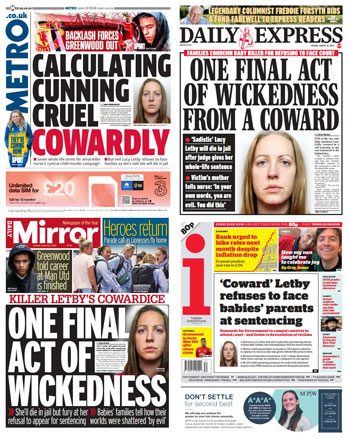
That “coward” line was used widely, but it felt to me like last-resort language – and how do we know? Her absences from the verdict and sentencing may just as well have been contemptuousness – for her victims and the process – as cowardice. Anyway, that’s a side issue. There is an understandable feeling that people convicted of crimes should somehow be compelled to appear in court to learn their fate and most papers (and politicians) duly played that tune to keep the story going an extra day or two. Without actually coming up with a workable way of doing it. One KC wrote to The Times to say the solution was simple: days held on remand in custody should not count towards time served. Extending the sentence would, he wrote, incentivise defendants to appear. But how does that work when you’re pretty certain the judge is about to tell you you’re never getting out of jail? How will a few extra days on a never-ending sentence persuade you to be compliant?
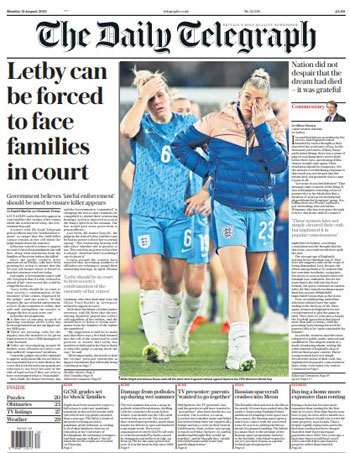
The Telegraph built a splash on prison officers being allowed to use reasonable force to get her back into the dock (they didn’t). Is that what we want, to go the way of America with orange boiler suits, leg irons and handcuffs? For all defendants? Or just those convicted? Who knows? But rest assured, politicians and Press on all sides are agreed that Something Must Be Done. Until Something More Important Must Be Done about Something That Crops Up Next Week.
But I’m racing ahead of myself to the sentencing, when the original question – how do you get the tone right? – related to the conviction. When you give over your entire front page to a football match (which is fine by me – I love a poster front page), you can’t suddenly find extra newsprint for the really big important stories. In fact, not one paper gave Letby the whole front page; no one was willing to sacrifice the all-important Saturday puffs, especially with the World Cup final coming, for a few murdered babies. So with the key decision – the puffs stay – made, what do you do to show that this is different? Turning the odd headline word red doesn’t really cut it.
Which picture should you use? The police mugshot that shows Letby in the worst light, as would be the case for any of us? Or the smiling nurse with the babygrow that is more likely the truer representation of the woman friends, colleagues and victims knew – and a demonstration of how deceptive appearances can be?
And what should be the main headline point? That she is the country’s worst serial baby-killer? That there may have been more victims (a favourite incontestable line with mass murderers, and the one chosen by the Mirror)? That she always seemed so normal and ordinary? Or the failings of management that allowed more deaths, even after consultants had raised the alarm time and again?

My own feeling is that giving her a “title”, such as “worst serial killer” (the line taken by the Guardian and i) somehow rewards her actions. It is only natural to wonder where she stands in the list of multiple murderers, and I’m forever saying newspapers are there to give readers information and to put matters in context, yet I was pleased to see the number of papers that resisted the urge to publish any kind of league table – notably the Mail, which filled 27 pages with the conviction yet restrained itself on that front. I’d say the one justifiable comparison was with Beverley Allitt, who killed four babies and harmed 11 others before being arrested in 1991. Both were dubbed the “angel of death”. “Angel” was for a while tabloidese for any nurse, thanks to a television series that ran in the 70s and 80s. It had ended eight years before Allitt’s arrest, but that didn’t stop the old cliché being wheeled out for her and, 40 years after the last episode, again for Letby. What is this obsession with giving nasty people nicknames?
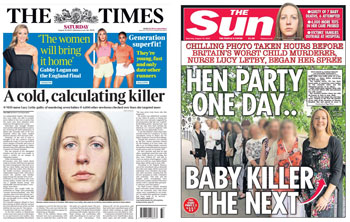
The Times produced a clean front page with the mugshot central under a heading “Cold and calculating killer”. This had the merit of sobriety. Which could not be said of the Sun, which had a picture of Letby in York with the headline “Hen party one day…baby killer the next”. The paper said the photograph with 13 friends (whose faces were all blotched out) was taken the day before the first killing, so quite a property. It would be unfair of me to suggest a lack of sobriety among the women – there are no tiaras or veils or pink sashes in sight – but the sunny jollity of the picture felt uncomfortable.
The point, of course, is that she was just an ordinary girl who enjoyed the sort of thing millions of other women do. An ordinary superficially attractive white girl, that is. And here’s the proof with her out on a happy weekend with a dozen or so other – almost exclusively white – women. Almost everyone described her as the butter-wouldn’t-melt church-going Miss Innocent girl-next-door, the subliminal message being not “people like her aren’t killers”, but “people like us aren’t killers”. Take that church-going bit and think about coverage of Muslim criminals. For them, going to the mosque isn’t portrayed as a sign that they are devout, God-fearing souls you could trust with your life; the mosque is more likely to be cited as a source of radicalisation. But a Christian girl? No, that’s quite different.
The focus on Letby herself was inevitable. Editors know that readers are fascinated by such people and while some titles might in other circumstances have produced a front page showing the babies, not their killer – as they did with, say, the Manchester bombing – such an approach was impossible here, since the victims and their families remain unidentified.
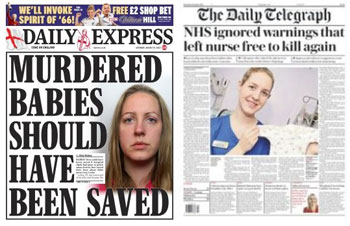
There was another line, however. And that was the doctors’ repeated warnings. For once, the Mailesque “How did they let this happen?” approach was spot on. Those doctors weren’t blessed with 20-20 hindsight. They raised their concerns, had them dismissed and were required to apologise to Letby for impugning her character. This was the real scandal and the real story. It was surprising that only the Mail, Express and Telegraph made it their main point. It may be no coincidence that all three have long given the NHS a hard time and are particularly scathing in their reporting of its management and bureaucracy, but in this instance the assault was entirely justified.
That said, it would be a push to say that any paper had got it right. As I said at the beginning, this is the sort of story that is impossible to get pitch perfect. We don’t do cool and unemotional these days. What I do know for sure is what was absolutely not the way to go about it. The Mail had the right (in my humble opinion) angle, and didn’t put Letby in any notorious killers league table. So, two cheers for that.

But it just couldn’t stop the self-promoting hyperbole, could it? A QR code on the front for readers to scan for a “gripping” podcast and video documentary and a puff to an eight-page pullout on the DEFINITIVE inside story. Then there were the pointers inside to “our brilliant” documentary from the team behind “our hugely successful” podcast and the full-page house ad inviting readers to “relive EVERY twist and turn in the most sensational murder case for years”. And, finally, that supplement (on top of 18 inside news pages) with its white-on-red Jack-The-Ripper-typeface title “The Killer in the Baby Unit”.
All those bereaved and devastated families turn out to be just a marketing tool as the true crime bandwagon rolls on. Nauseating.
Footie-mad Mail

Those puffs seemed to me to be symptomatic of a new brashness at the Mail and I wonder if that is because Ted Verity has finally pushed Paul Dacre’s hand off the tiller. I may be completely wrong about that, but there is definitely a more strident tone (some may have thought that impossible, but they probably also thought that before Suella Braverman replaced Priti Patel at the Home Office. I couldn’t possibly comment).
The first evidence came in the new puff variant noted here a few months ago. Then there was the conversion to football. They really have got the bug at Derry Street. Not only was there a poster for the new Premier League season, there are now pull-outs on Saturdays and Mondays (Match Day and The Verdict) plus a podcast. The target market is obvious from the busy page design, the typography and the puns scattered through the supplements, which are a world away from the super-savvy news and feature pages. I know nothing, but I’m not convinced the Mail’s Middle-England middle-class audience will appreciate this heavy-handed approach. And I’m pretty sure that old hands at the Sun, Mirror and Star will be chuckling at the johnny-come-lately’s assertion that it offers “unrivalled coverage and analysis”.
It did, however, have the Lionesses all over The Verdict, along with the latest Premier League action, on Monday. Every other “football” pullout stuck with the men’s game. As you’d expect, there was masses and masses of World Cup heartbreak up front and the women made every back page, but the “Prem aces” have since reasserted themselves. Farrell and the rugby are giving them a run for their money, but will lose in the end.
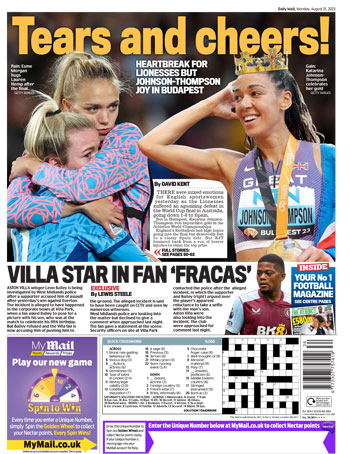
While the Lionesses were losing the World Cup, another British woman was winning her world championship. Katarina Johnson-Thompson won the heptathlon gold at the athletics championships in Budapest, regaining the title she last won in Doha four years ago. Quite the achievement at 30 in a multi-discipline sport. Here, again, the Mail came up trumps, splitting the back page between the two female competitions with “Tears and cheers” (The Sun had the same headline in reverse – “Cheers and tears” – on its news pages, but that referred only to the football).
The Sun started the KJT story in a deep puff and everyone but the Star and Telegraph managed a pointer from the back (or front in the case of the Telegraph, which has a separate supplement for sport on Monday). But in almost every case, the real coverage was deep in the section – after the racing if you work from the front; way, way after the lowest league football if you work from the back. Only the i gave her a single sentence on the front.
Any other Monday, she would have – or should have – been the main photograph across the newsstands.
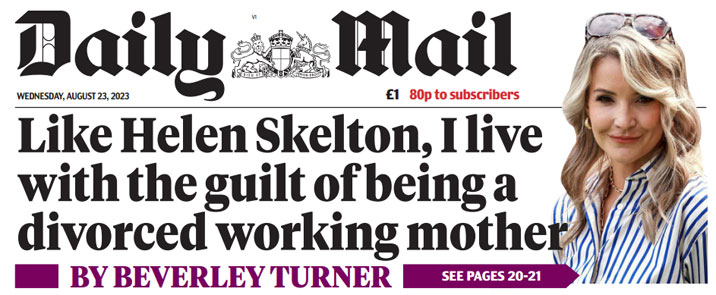
If Dacre has, indeed, stepped aside, one defining feature of his editorship remains. Working mothers are responsible for many, if not all, of society’s ills. And divorced working mothers. Well…
Nothing like guilt-tripping your core readership is there?
Wish you were there

We can, I think, assume that Allister Heath’s Sunday Telegraph hasn’t been converted to football – or at least women’s football – to the same degree as the Verity Mail. Last Sunday was The Day, so naturally the Lionesses were everywhere: pictures, posters, puffs. “We can do it”, “Bring it home” etc etc.
Apart from the Telegraph. Its front-page picture was just like any other week: a couple of royals. In this instance, it wasn’t Kate looking beautiful, but her husband and daughter staring at the camera. They were sending a video wishing the team luck in Australia. Of course, as has been pointed out elsewhere, had the men been in the final, William and Rishi would have been in the stadium. But they weren’t. Air miles; the planet, don’t you know? But which planet do you have to live on to believe that on that day of all days, the Prince of Wales and Princess Charlotte were the people of the moment?
Mason Greenwood – will he, won’t he

The Sun, as we saw last time, is partial to putting stories about Prem aces – or, even better, England aces – on its news as well as sport pages. Yesterday it was splashing on Mason Greenwood and his future, or lack of it, with Manchester United.
On the one hand, you have to feel sorry for the Bun on this one. Last Thursday, it ran a page 11 lead saying that Greenwood would be back playing at Old Trafford “as early as next week” after the collapse of rape and coercive control cases against him. The story was all about his rehabilitation and quoted from a club statement that mentioned the “partial evidence” in the public domain. The impression given was that the only reason to delay his return was to consult the club’s female players who were on England duty at the World Cup.
Now, if you’ve been with me down this sort of road before, you’ll understand when I say this was more a Giggs than a Mendy case. Unlike Benjamin Mendy, who was cleared of all rape charges after two trials, Greenwood hasn’t been found not guilty. Rather, like Ryan Giggs, the CPS called a halt because the complainant was unwilling to proceed. Which clearly leaves both club and player in a difficult position. (One does wonder if it would be quite so difficult for the club were he less talented.)
But that “partial evidence” in the public domain is deeply disturbing. Millions of people have heard it and, unless Greenwood is claiming that he is not the man on the recording, there is no doubt that his behaviour was disgraceful and unacceptable. This was not a tape of consenting adults behaving as they wished in the privacy of their home. (And remember that consenting adults behaving as they wished in private, but not in the way the Sun thought appropriate, was enough to destroy Huw Edwards.) It was a tape of a man bullying and swearing at a reluctant partner. A man, however young and immature, whose professional position means he cannot escape the responsibility of being a role model for other young and immature men and boys.

Why feel sorry for the Sun? Well, its report that Greenwood’s return was imminent brought a wave of protest outside the club and on social media, and aroused the interest of other outlets.
The TV presenter Rachel Riley, a United fan, said that she would no longer support the team if the club reinstated the player. This made a page lead for the paper, which had “Riley” “wading in” over “Mason”. If ever there were a mismatch of second and first names that was it. Readers could be in no doubt as to whose side the paper was on.
By Saturday, after more protests, the Sun was reporting exclusively online that United were going to dump Greenwood, a story that would make another news page lead in the next day’s print edition. There had been a U-turn.
The paper had probably been right at every point in the story, but it ended up looking as though it hadn’t a clue. So, yes, sorry for the Sun – up to a point.
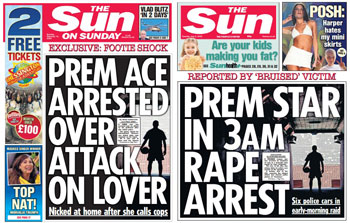
For a paper that has splashed several times on “Prem aces” facing accusations over their sexual activities (often illustrated with the same silhouette shot of man with ball under arm emerging from players’ tunnel that makes you wonder if it’s the same person in every case or just coincidence that the designers keep using the same stock shot), it seems incapable of distinguishing between Jack The Lad behaviour and assault. Each story is treated as a one-off. Yet the paper seems to have accumulated enough testimony over the years to recognise that there is a serious problem within the game. It could do some good journalism, and look at the wider culture that is leading to so many complaints, but it doesn’t; instead, it writes in a chummy way about “Mason” and “Ryan”.
It could have reported many women’s concerns about Greenwood, but focused only on one well-known face.
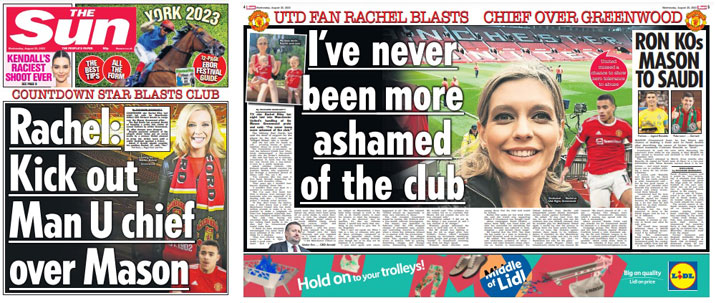
Yesterday, that well-known face made it to the front – this time calling for the club’s chief executive to go. There was also a spread inside and “Riley” had been promoted to “Rachel”. Her opinion suddenly seemed to matter. But Greenwood was still “Mason”.
I don’t think Rachel Riley’s thoughts on Greenwood or the constitution of the Manchester United board are important of themselves. They may be as a signpost to what others are thinking, but one woman’s opinion is not worth this much attention. Why not go and interview the women with banners outside Old Trafford? Why not talk to domestic abuse organisations, mentoring organisations, anyone with experience and expertise in teaching stupendously wealthy young men with the world at their feet basic rules of decency? What do clubs do to help their stars cope with these untold riches? Where is the pastoral care?
There is so much to be looked at and written, but hey! Let’s not bother, let’s just quote a woman who does arithmetic on a daytime TV show.
Holiday clash
Columnists are the gods of the newspaper universe. They can dictate terms as demanding as any Hollywood A-lister, and even those whose name is not Boris Johnson can command fees that make the news departments weep. One star writer’s salary could furnish the production team with five experienced subs. And one word removed from or injected into that star writer’s precious prose could cost one of those subs his or her career.
Not for them the haggling over who gets the school holidays that is the lot of mere mortals the moment the annual leave calendar opens up at the end of the year. They come and go as they choose.
Why do they wield such power? Because columnists give a newspaper its voice. News you can get anywhere. Opinions are also freely available, but writers who can spin a comely phrase in projecting an argument are regarded as something special. They are paid huge amounts of money because they are thought to bring in the readers. Readers who no longer get much change from a fiver for a weekend fix.
And what were readers of the Times given when they turned to the comment section over the past couple of Saturdays? Matthew Parris is away. Giles Coren is away. Janice Turner is away. Matt Chorley is away. You wouldn't blame them if they asked for a refund.
You will sense that I disapprove of this co-ordinated dereliction of duty. But I must now confess that a similar notice will feature on this website next time the Notebook is due to appear. France beckons.
Some things are more affordable than others
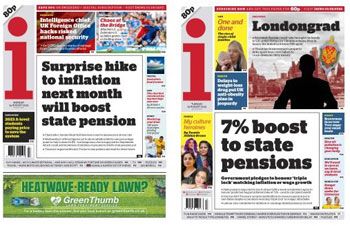
Do papers have so little faith in themselves that they don’t think readers believe what they write? On Monday last week, the i splashed on pensioners being in line for a big increase because after a drop in inflation, there was likely to be a slight upward blip in September – the monthly figure that counts when setting benefit levels.
Then, on Tuesday, it splashed again on pensioners definitely being in line for a big increase – because the Chancellor had confirmed what the paper had written the day before.

The Express jumped on the train the next day with “Bumper rise in state pension to £11,469”. This was so much more important than three suspected Russian spies being arrested in suburbia.
The Express is always concerned with pensioners’ incomes and freebies; it accepted that all sorts of sacrifices had to be made in the Covid years but railed at the suspension of the “triple lock” mechanism that gives pensioners the best of three worlds. It celebrated when it was revived and, having fretted over rising mortgage rates, is now pleased that we oldies are in line for a 7% pay rise next year.
This, remember, is the paper that faithfully reports ministers’ assertions that the country can’t afford those sorts of rises for public servants. So, the people who nursed and cared for the oldies during the pandemic must go without while those they saved and protected are given more. This, in the Express’s eyes, is as it should be.
Disappearing treasures
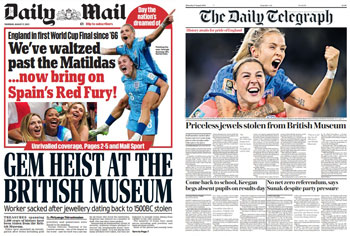
It wasn’t only the spies who got short shrift from the Express, it was equally unperturbed by what I would say was the story of the month: the discovery that artifacts going back thousands of years had been disappearing from the British Museum and turning up for sale on ebay.
But so was most of Fleet Street. If the simple fact of the vanishing gems wasn’t enough, you might have thought that the dismissal of an expert and the ramifications for the museum’s international reputation, with the reopening of the old Elgin Marbles wounds, would wake papers up. Well they did, to a degree. Everyone picked up on the story eventually and found decent space inside. But it was particularly disappointing that neither the Guardian nor the Times, which are generally regarded as both serious and culture-minded, thought it merited anything on the front.
I wouldn’t describe the leeching away of goodies as a “heist”, but good on the Mail and Telegraph for splashing on the story – and for demonstrating that you can get swept away with the footie (the Lionesses had just won their semi-final) and still find room for news.
Who’s not on the list?

Interesting choice of picture on the Sun’s front page a couple of Sundays ago. Holly Willoughby not being nominated for a National TV Award. She wasn’t nominated last year either, so the “snub” line doesn’t really work. Inside, there was more of the same with Harry and Meghan also being overlooked. What is it with all this crowing over those who didn’t make the list rather than focusing on those who did?
Misleading headline of the week

A pretty shocking headline here from The Times on the deaths of six people trying to cross the Channel in one of those small boats.
As a former colleague noted, it gives the impression of piratical gunfights on board that led to the sinking, when in fact the clashes were onshore “in the hours” before the vessel took to sea.
Michael Parkinson, sports journalist
Michael Parkinson had a lot to answer for. While most remember him for his talk shows, the meetings with Muhammad Ali and Rod Hull’s Emu, the dinosaur sexism in his interviews with Helen Mirren and Meg Ryan, for me his name always takes me back to Sunday mornings in the flat above my parents’ restaurant. It was the Sixties. I was a football and cricket mad teenager. He was a football and cricket mad writer. His column in The Sunday Times, full of Barnsley wit, was the highlight of my week. It’s what made me want to be a journalist. And so it’s his fault you’re stuck with me here.
The papers were generous in the space they gave him when he died last week and there was some good stuff to be had. I particularly liked this front-page treatment from Metro.
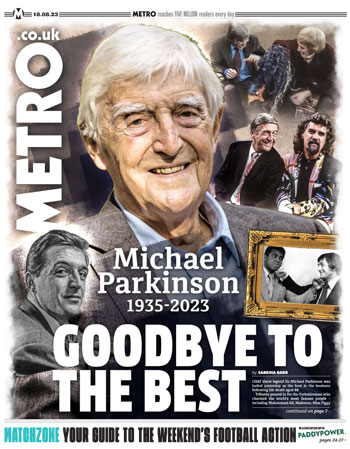
Front page of the fortnight
That photograph-come-watercolour style montage was honed for the Lionesses this week to become a joint winner of FPOTF.
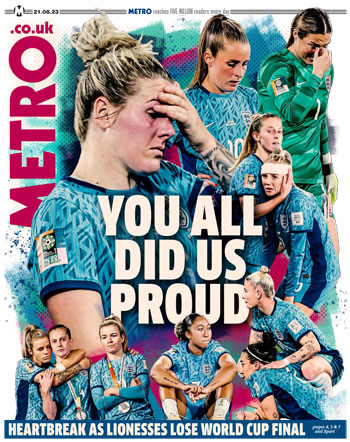
There have been many striking covers this week with the World Cup and the Letby case. But for imagination and clever niche marketing, I’m plumping for the Evening Standard, which marked the start of the Premier League season with a bespoke front for each London club. Bet the circulation teams loved the logistics of that one.
Congratulations to head of pictures Elliot Wagland for a great idea brilliantly executed.
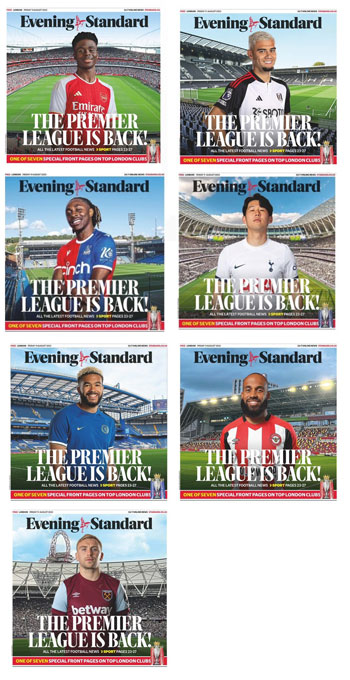
Mystery of the fortnight

Metro may have come up with some excellent covers this past couple of weeks, but this morning? While the rest of Fleet Street – including the Star – rose to the occasion on the killing of Russian mercenary-chief-cum-Putin-mutineer Yevgeny Prigozhin, Metro went its own sweet way with the Indian moon landing.
That might have been a good call in other circumstances – rivals might have pencilled it in as at least the picture, if not the splash, before that plane crash – but it looks bizarre. What were they thinking? They got the story on page five, so surely deadlines couldn’t be the issue? Maybe they found it so unsurprising that they thought it was un-newsworthy?
Meanwhile, here’s a selection from this morning’s crop. Pretty good, I reckon.

Liz Gerard’s Notebook is a fortnightly column published in the InPubWeekly newsletter. To be added to the mailing list, enter your email address here.












